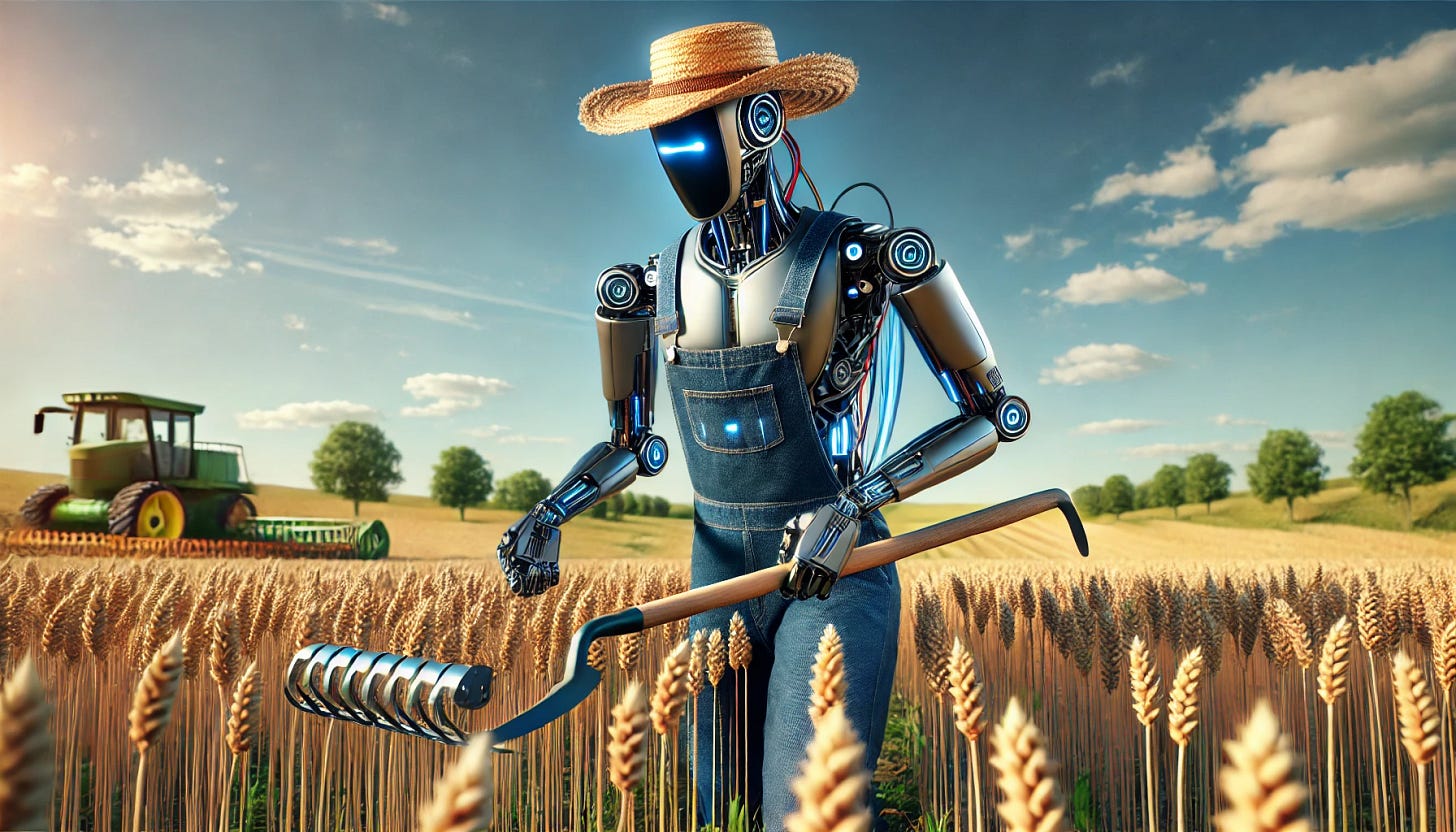Will AI Eliminate Art and Creativity Like Robots Automated Mundane Physical Tasks?
It took hundreds of years to automate factory work. Automation of deep thought and creativity are advancing much faster.
For millennia, humans toiled in a largely agricultural society, using their raw strength, simple tools, and animal power to eke out an existence. Those societies that were able to procure excess food on a regular basis (e.g. Egypt) could make strides past this hand-to-mouth1 existence to pursue writing, education, and the construction of astounding structures that we don’t fully understand today.
A few thousand years later, the industrial revolution brought literal and figurative power to the masses, leading to advances in manufacturing and the overall standard of living over the next few centuries. While there was and is still much poverty and societal stratification, one can see the roots of opportunity taking hold in the 18th and 19th centuries. By the late 20th century, many were living a rather cushy lifestyle in historical terms, with resources and opportunities once reserved for royalty now widely available.2
Per this excess, we can afford a wide variety of entertainments and creative expressions, and many of us make a good living doing simple tasks like loading machines in automated factories, driving vehicles, and pushing floor cleaning machines. Not everyone can be a rock star, professional athlete, painter, or even… someone who writes commentary about the world of automation and technology.
Or rather, everyone can do such creative things, many of us simply need a more mundane job to afford to put food on the table. One might even say that the mundane jobs inspire the need to create (i.e. recreate) in a less structured way outside of your “9-to-5” job. With more automation, fewer of these mundane jobs exist now than they did a decade or two ago, and I suspect fewer still will be available in the future.
On a macro level, the theory goes, more automation should free up more laborers for even more valuable work, e.g. engineers, doctors, etc., and to pursue more creative… pursuits full time. Those that continue in more traditional mundane jobs would–in theory–get paid more money, generating capital to pay for more and nicer things and entertainments.
Slow automation advancement, fast creative changes
Working in factory automation for around a decade, I rarely looked at what I did as eliminating jobs, more as eliminating jobs that are really, really boring–if I even really considered it. I never saw a situation where I put in a new machine and the bosses got rid of someone(s). Improvements happened slowly, and any reduction in manpower was largely a matter of making people’s jobs (including my own)3 easier, and a gradual reshuffling by management.
This sort of physical automation didn’t generally apply to engineering, design, physical art, music, acting, medicine, and other pursuits that take more mental skill and creativity than, say, placing a bearing race on a piece of tooling a few thousand times per day.4
Unfortunately, it seems that AI is taking over such “brain” professions even faster than more dull physical tasks. So when factory and even retail jobs are eliminated today (per Amazon et al), I’m not sure what we are supposed to do with ourselves as a society when jobs are also being consumed from the “higher brain” and artistic layer of employment by computers/AI.
We can and should still create art for its own sake as we do now, but I think the gap between hobbyist and professional will get wider and wider as the realm where AI is good enough continues to increase. There are differing opinions on how this will play out in the artistic world (see AI Music Creation Is Here: Will It Change Everything?), but is “AI art” good enough for hanging on the wall at midpriced hotel chains and other such outlets? If it’s not now, it will be soon.
More practical pursuits will be affected as well, such as image analysis advances in medical diagnoses, e.g. radiology. At least in the medical field, my hope is that if certain medical professions can be greatly assisted, or even eliminated, by AI, this brainpower can migrate to where AI isn’t yet competent, helping with our current shortage of physicians.
Looping back to art, this whole argument is a bit ironic as “AI” is simply (well, not that simply) amalgamating humanity’s digitized creation into “new” “art” on command. On the other hand, one could argue that’s what we do as humans anyway, copy what we’ve seen and combine in novel ways.

What happens to humanity in 20 years?
In conclusion, robots are certainly taking our drudgery away, and have been for many years,5 but they are currently taking away our opportunity to make money off of creative/brain pursuits at a rapid clip. Humans will certainly still be needed,6 but it’s hard to imagine that we would need anywhere close to the same labor participation rate that we do today.
One might see that as a good thing. Perhaps it would be good for us to take a look at just how much work each individual is doing. As much as we might not want to admit it, a world without the need to work is (in my opinion) a recipe for disaster, or at least widespread boredom and lack of motivation/purpose.
Or maybe we will see a return to a world where only one parent works, leaving the other to focus on raising kids. I’m honestly a bit skeptical about the long-term detrimental effect of a collapsing population (after all, the much smaller world population was OK 500 years ago), but having one working parent as the standard could help reverse the current/future trend of population decline. Perhaps the bigger question that needs to be asked is that if robots are taking our jobs away, why do many families need two incomes to survive when one was good enough before the automation/AI revolution of the last 50 years?7
Predictions and questions that will need to be addressed
Skilled trades will still be around - while we might see robot lawnmowers become more prevalent in the future, I don’t see robots taking over for plumbers or electricians any time soon.
In a 32% tongue-in-cheek article, I predicted that mechanical engineering would be a goof profession for an AI dominated future.
Ownership - if you look at this AI-generated video of Will Smith eating various foods, it is very hard to tell that it’s not him8. Who owns this footage from a legal and moral perspective? Is it Will Smith? Is it the companies that produced the footage from which its sourced? Is it the author of the AI, or even the person who put in the prompt? Is it me since this is my website? At least I can say that last one isn’t true.
New opportunities for people? - If we can use the likeness of an already-known person for anything we want in the future, is there a realistic opportunity for new people to break onto the scene (whatever scene that may be)? It would certainly limit opportunities.
Is it really different this time?
If that all seems a bit depressing, just remember that we’ve been here before, over and over, through various technological revolutions. The world today is unrecognizable versus 100 years ago, but we still largely have jobs, and on a macro level the world runs fairly well, all things considered.
I imagine society will be much different in the next 100 years, but I also think that people, society, and work will be here in some form or fashion, perhaps even flourishing in a way that we never imagined!9
Any Amazon links are affiliate
Addendum/Footnotes:
A bit of a meaningless expression. Hand-to-mouth could mean eating modern processed hand food like sandwiches and potato chips, or ripping flesh off of a deer to stuff it in your mouth. OTOH, I’m not sure where ancient Egyptians were on the forks/spoons/chop sticks invention spectrum, but based on historical films like The Fifth Element and The Mummy, knives seem to at least make an appearance IIRC.
Evidence: As long as “low calorie” is seen as a food selling point, we’re doing waaayy better than the vast majority of society throughout history that was always under the threat of famine/starvation. Also consider that having a pineapple was once seen as a sign of great wealth. Now, as discussed further in this Questionable Use Case post, they’re available at Costco for under $3, or 12 minutes of labor at $15/hour.
At the same time, I have to acknowledge I’m writing this as a US citizen born into good circumstances. Those born in other places, say the Gaza strip or Somalia, might see things differently.
As a manufacturing engineer over a specific line, your goal really should be to make your life easier, even if it means working yourself out of a job!
Yes, that is a very specific example. There is a plant somewhere in South Carolina that has a lot of bearing assembly tooling with the initials “JSC” lasered into them.
As a family of 5 I’m not sure where we would be without our dishwasher, washing machine and dryer. Also, our battery-operated Dyson vac is awesome, which is especially useful for the 6th member of our family–who walks on four legs and constantly sheds.
Especially where hands-on skills meet brainpower: e.g. plumbers, heart surgeons, chemical engineers. And not just fields involving critical liquid transportation.
Or, I have to admit, maybe not. Sci-fi’s only predicted the end of society per robotic hijinks like 1000 times. And if you’re looking for some good Sci-fi commentary, be sure to read my uninformed predictions on the Dune movie potentially coming out in 2032 👇




